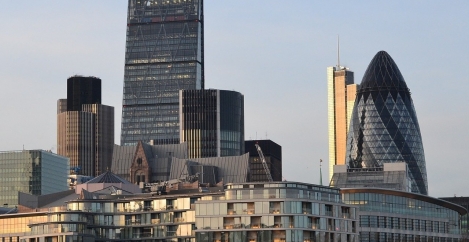May 31, 2023
Office refurbishments rise to all time high in London
 According to the latest London Office Crane Survey from Deloitte, London has seen the highest volume of new office refurbishments since records began in 2005, with 37 new schemes covering 3.2 million sq. ft. The volume of all projects including both office refurbishments and new space is up by almost 80 percent, with the West End continuing to lead the way. The report claims that over 10 million sq. ft. is now projected to be delivered during 2023, with this year on track to catch-up after several years of disruption.
According to the latest London Office Crane Survey from Deloitte, London has seen the highest volume of new office refurbishments since records began in 2005, with 37 new schemes covering 3.2 million sq. ft. The volume of all projects including both office refurbishments and new space is up by almost 80 percent, with the West End continuing to lead the way. The report claims that over 10 million sq. ft. is now projected to be delivered during 2023, with this year on track to catch-up after several years of disruption.
This is the highest number and volume of refurbishment starts since Deloitte began tracking them across the seven central submarkets in 2005. This increase has been driven by a need to reach the anticipated Minimum Energy Efficiency Standard (MEES) regulations to achieve Energy Performance Certificate (EPC) B rating by 2030. Demand is shifting to the highest quality space, with employers looking for space that attracts and retains talent, aligns with their brand, and embraces new working practices.
Sophie Allan, director in real assets advisory at Deloitte, said: “Developers seem to be cautiously optimistic about the future of London’s development pipeline. Positive signs include a huge increase in the volume of new starts compared to the previous survey, and the highest volume of refurbishment starts on record, as developers race to avoid obsolescence. New infrastructure and expanding transport links have attracted people to previously overlooked areas like mid-town and the eastern fringes of the City. This is undoubtedly a vote of confidence in London after the intense disruption of the pandemic, disturbance to supply chains and rising inflation experienced over the past year.”
Development pipeline
New office starts have risen by almost 80 percent, when compared to the Winter survey. Volume is now at 4.4 million sq. ft. and new construction is starting across 50 schemes. Since the last survey in Winter 2022, the average new scheme size has risen from c.79,000 sq. ft to c.88,000 sq. ft.
West End new starts are up for the second consecutive survey with the volume rising to 1.3 million sq. ft., showing it is a market of increasing occupier focus. The City has dropped to just under 600,000 sq. ft. in contrast and has seen a steady decline in activity over the past few survey periods.
Margaret Doyle, chief insights officer for financial services and real estate at Deloitte, said: “Following pandemic-induced home working mandates, many businesses are now encouraging office attendance more proactively and are considering how to attract employees back to the office. Tenants’ shift toward quality over quantity has led to desire for attractive, sustainable, well-kitted out space, close to transport hubs and amenities. We expect that the need to bring offices up to scratch – especially in terms of energy efficiency – will drive London’s development for the rest of the decade.”
A total of 22 schemes, covering 3.6 million sq. ft., that were previously estimated to complete within this survey period, have now pushed their estimated completion dates to the remaining three quarters of 2023. With over 10 million sq. ft. now projected to complete, 2023 looks to be on track to catch-up with many long-delayed completions.
Sophie Allan added: “Whilst construction levels remain high, developers are acutely aware of elevated construction costs, which remains the biggest challenge, with both labour and material seen as major drivers.”
Similarly, respondents to Deloitte’s latest CFO Survey cited persistent labour shortages as one of the top risks to business. However, they expect this to improve over time, with a marginal improvement over the next 12 months and the elimination of significant or severe recruitment difficulties in two years’ time.
Environmental, social and governance
Developers continue to crave further clarity around the definition of net zero but are, in essence, eager and committed to achieve it. Responses ranged, but for the most part the belief remains that developments will hit their net zero target between now and 2030. With the expected tightening of the MEES regulations, developers and building owners are recognising the pressure to ensure that their buildings achieve a minimum of EPC B by 2030.
Philip Parnell, real estate valuation lead at Deloitte, said: “At a time when many of the traditional drivers of development activity such as capital value growth are lacking, a combination of positive ESG-related opportunities and downside stranding risks associated with physical obsolescence and accelerated value erosion, means there is strong stimulus for renewal.”
Additional figures from the research showed:
- Just over a third of space under construction – 5.3 million sq. ft. – has been pre-let, with legal occupiers having taken 31 percent of this volume, making it the most active tenant sector yet again. Confidence about demand seems to be reflected in developers’ sentiment that the leasing market has become more stable.
- Project finance costs have remained elevated since the last Winter 2022 survey.
- Tender pricing expectations over the next 12 months are lower than the previous survey, with 70 percent of respondents expecting prices to continue to rise, down from 80 percent.














